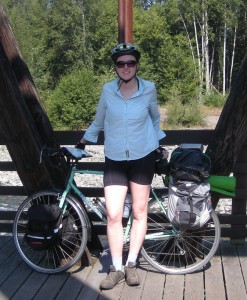When I tell new people that I enjoy bike touring, I tend to get looks that range from impressed to horrified. People seem to either think that it’s an adventure that they could never possibly enjoy themselves, or a supreme torture that would only be fun for a complete glutton for punishment. It’s definitely in the middle of those two extremes, and like any activity, it takes some planning and preparation for things to go well. I went on my first tour when I was 12 years old on a trip run by my local Girl Scout council. After spending a week in our local camp learning basic bike maintenance and riding around our trails, we went on a three-day trip to ride the Cedar Valley Nature Trail. The trail itself is a converted railroad track, which would make for easy riding, but our three days gave us the worst that an Iowa July could offer. The key moment of the trip was when we were all cowered in a ditch waiting for a severe storm to pass, but, luckily, a farmer invited us to take shelter in his barn before we got too wet. It’s good that my touring adventures as an adult have gone better than that first trip, or I definitely wouldn’t have kept up with the hobby. I’ve only gone on a few trips as an adult, with the largest being a tour across the north side of the Olympic Peninsula. Still, I have learned some key lessons that apply to my nonprofit career:
Plan and prepare:
Any endeavor worth kicking off will work better with at least some level of planning and preparation. For touring, this means tracking down gear that will match predictable weather conditions – including waterproof gear when traveling in Western Washington – and thoroughly investigating your route and campsites to make sure you won’t have unfortunate surprises on the trail. As it applies to my professional life, I have learned that there’s rarely a better investment than in the planning portion of a new project or campaign. As much as we in the nonprofit field are pressed for time and funds, we have to fight the urge to jump in without first assessing the environment. I’ve talked to many nonprofit leaders frustrated at past decisions to go with the free website or database that will be implemented quickly only to find out that those wouldn’t meet long-term (or even short-term) needs. We more than anyone need to plan well to make sure that our precious staff time and other resources are used effectively.
Value knowledge in your community:
While preparing for our tour, we read lots of books and read reviews and comments about trails, but nothing proved as valuable as the information gathered by real people on the road. They were able to point out alternate routes and other hints particular to our trip that we wouldn’t have found on our own.
Similarly, projects a nonprofit can undertake will have lots of printed and online resources available for your research, but make sure to also include outreach to others who have been there before. They will likely be able to provide key insights into process, vendors, and tools that may not come out in the average online review.
Take joy in self-sufficiency:
Probably my favorite feature of bicycling is that it allows me to take care of myself so well. I’m still a pretty novice mechanic, but I can still handle he majority of problems that my bike has had – poor fit, flat tires, wobbly wheels, and inconsistent shifting for starters. I spent a lot of hours learning these skills, but I value each and every one of them knowing that the time spent is paid for ten-fold by being able to take care of those issues myself. Nonprofits, especially in regards to technology, are often lured by a low up-front cost for their tools and solutions. It’s only when they get to the end of the project do they find out that their consultant won’t train their staff, or the tool is too unwieldy for their staff to handle without paying an expert for basic maintenance. My key advice is to nonprofits it to make sure to include ease of use as a key feature to research for any prospective tool. In addition to a user-friendly tool meaning lower costs, you will also greatly value, especially in our fast-paced world, being able to make quick changes rather than waiting for a consultant to make them for you.
